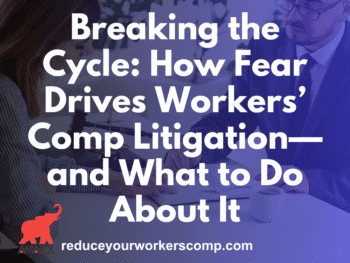The number one distinction between the excellent workers compensation adjuster and the average adjuster is the ability to distinguish when the claim should be settled. The lazy or indifferent adjuster will often push to settle a workers comp claim quickly, regardless of cost. The excellent adjuster will also want to get the claim settled quickly, but will be patient for the most opportune time to settle thus minimizing the overall cost of the claim. The excellent adjuster will have a working knowledge of the underwriting of workers compensation coverage and realize the amount spent on each claim has an impact on the employer’s workers comp insurance premium.
Click Link to Access Free PDF Download
“How To Avoid, Manage, And Win Workers’ Comp Claim Litigation”
The professional adjuster starts moving the claim toward settlement immediately upon receiving the new injury claim. The adjuster understands everything that is done on the claim can impact the settlement, whether it is confirming coverage, making initial contacts, completing a thorough investigation, obtaining medical information, or arranging the return to work or any other action taken by the adjuster. The adjuster knows that by following Best Practices throughout the claim handling, the most economical settlement will be reached. [WCx]
The adjuster has to walk a fine line in the settlement of the claims. The adjuster has the task of making sure all applicable workers compensation benefits are provided to the injured employee while at the same time being sure the correct amount is paid on every benefit provided whether it is medical treatment, indemnity benefits, vocational rehabilitation, legal fees, or other expenses. The biggest potential for a mistake on the overall cost of the claim is the decision on when and how to settle the claim.
In almost all situations it is not to the employer’s/insurer’s advantage to consider settlement of the claim before the employee has reached maximum medical improvement. If the employee is anxious to settle the claim before the medical provider has provided a long-term perspective on the employee’s future medical status, the adjuster should consider the effort to settle the claim prematurely as a red flag waving, and carefully review the validity of the claim.
There are three financial consideration questions the adjuster should utilize in determining when to settle the claim.
- Is there a cost savings by settling the claim now versus continuing to pay weekly indemnity benefits and on-going medical cost?
- Will settling the claim now eliminate unnecessary legal cost?
- Will settling the claim now eliminate the risk of a more adverse outcome?
When the employee has reached maximum medical improvement and has been given a disability rating, the workers compensation statutes of the jurisdiction will specify how much the injured employee is entitled to in compensation. Consider the employee, who as a result of his injury will never be able to return to any type of employment. For example, the state limits disability benefits to 500 weeks, and 100 weeks have already been paid to the employee. If the employee’s weekly benefit is $600 and the employee will be paid for another 400 weeks, or a total of $240,000, does it make sense to settle the claim now or is it better to leave the claim open for 400 more weeks?
The answer depends on the amount the employee/employee’s attorney is willing to settle the claim for. The settlement amount must be equal or less than the present value of the money the insurer would invest to produce the income stream needed to pay the employee. For instance, the insurer would need to invest $200,000 to produce the income stream over the 400 weeks. If the employee wanted to settle the claim for $175,000, it would be in the best interest of the insurer to settle. However, if the employee demands $225,000 to settle the claim; the insurer would do better to continue to pay the $600 per week, as their eventual total cost of the claim would be less.
A common mistake made by adjusters is to litigate the claim when the claim should be settled. If the adjuster has properly established the settlement value of the claim, the time to resolve the claim is when the settlement value has been established, not months or years later after extended litigation. If there is nothing to be gained by delaying the settlement further, the time to settle the claim is when the value of the claim can be established, whether or not the claim is in litigation.
My general rule of thumb is: if the claim is going to be settled, do it now rather than later, because every week the claim is ongoing indemnity costs are being paid, so why wait an extra 6 months vs. settling it now, assuming all other things are equal.
Synthroid no prescription
Fluoxetine without prescription
buy ventolin online
This is assuming that the employee’s attorney will encourage the employee to settle for the proper value of the claim. There are plaintiff attorneys that will intentionally refuse to settle the claim for the proper value in an effort to extort additional compensation from the insurer. In those cases, the adjuster is better off not to settle the claim until the employee’s attorney is willing to encourage a fair settlement. If the adjuster overpays on the claim to get it settled, the plaintiff’s attorney will remember and make excessive settlement demands on all future claims with the adjuster and/or insurer.
There are situations where it is better to settle the claim for what could be considered a high amount. For an example, the employee was seriously injured. The medical provider has placed the employee at maximum medical improvement with a fairly high permanent partial disability rating. The employee’s attorney is maneuvering to get the employee declared to be permanently and totally disabled. The medical information and vocational information is such that there is a possibility that the employee could be found to be totally disabled by a workers comp judge. To avoid what could be a much larger settlement, the adjuster (normally with the concurrence of the claim office management) will make a decision to settle the claim for a higher than normal amount to avoid the potential of having to pay even more due to adverse ruling on the claim if it is not settled.[WCx]
Overall, the time to settle the claim is when the most economical outcome will be produced. The adjuster should always keep this in mind once the employee has reached maximum medical improvement.
Author Rebecca Shafer, JD, President of Amaxx Risk Solutions, Inc. is a national expert in the field of workers compensation. She is a writer, speaker, and publisher. Her expertise is working with employers to reduce workers compensation costs, and her clients include airlines, healthcare, printing/publishing, pharmaceuticals, retail, hospitality, and manufacturing. She is the author of the #1 selling book on cost containment, Workers Compensation Management Program: Reduce Costs 20% to 50%. Contact: RShafer@ReduceYourWorkersComp.com.
Free WC Calculator: www.LowerWC.com/calculator.php
Learn about our book: www.WCManual.com
Do not use this information without independent verification. All state laws vary. You should consult with your insurance broker or agent about workers comp issues.
©2012 Amaxx Risk Solutions, Inc. All rights reserved under International Copyright Law. If you would like permission to reprint this material, contact us at: Info@ReduceYourWorkersComp.com.
buy buspar online
Clomid no Prescription
buy Isotretinoin online




























I went to workman court with my attorney to settle my case. She came back with a offer of $275,000.00 so I agree and process started then I get the adjuster has not responded yet. Then it took to long and had to redo the paper work. It took forever so I called the attorney and she said they don’t want to settle now. If I accepted the offer how can they go back on the offer. Can some one explain that? How can I make them settle?
I want to settle my case I reach maximum medical improvement my injury doesn’t leave me too much choice to do something my lawyer asked for certain amount of money for settlement but every time I talk to my lawyer they didn’t (workers comp)respond yet I’m becoming really suspicious and scared what should I do if anybody please give me an answer they still paying me every week is there any way that I can make them talk about settlement please help I’m scared they’re going to close the case or something because my injury is pretty serious
You have some helpful information here about workers compensation. I like how you talked about settling sooner, rather than later. If you are paying a weekly sum, why put of the settlement date, like you said? I have never dealt with workers comp , but I will remember this.